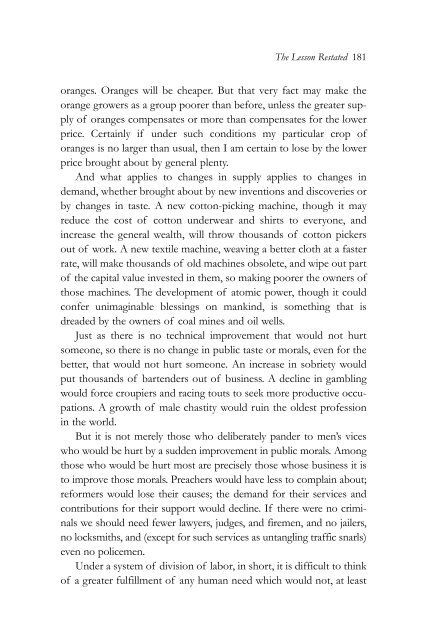1gDdM7w
1gDdM7w
1gDdM7w
- No tags were found...
Create successful ePaper yourself
Turn your PDF publications into a flip-book with our unique Google optimized e-Paper software.
The Lesson Restated 181oranges. Oranges will be cheaper. But that very fact may make theorange growers as a group poorer than before, unless the greater supplyof oranges compensates or more than compensates for the lowerprice. Certainly if under such conditions my particular crop oforanges is no larger than usual, then I am certain to lose by the lowerprice brought about by general plenty.And what applies to changes in supply applies to changes indemand, whether brought about by new inventions and discoveries orby changes in taste. A new cotton-picking machine, though it mayreduce the cost of cotton underwear and shirts to everyone, andincrease the general wealth, will throw thousands of cotton pickersout of work. A new textile machine, weaving a better cloth at a fasterrate, will make thousands of old machines obsolete, and wipe out partof the capital value invested in them, so making poorer the owners ofthose machines. The development of atomic power, though it couldconfer unimaginable blessings on mankind, is something that isdreaded by the owners of coal mines and oil wells.Just as there is no technical improvement that would not hurtsomeone, so there is no change in public taste or morals, even for thebetter, that would not hurt someone. An increase in sobriety wouldput thousands of bartenders out of business. A decline in gamblingwould force croupiers and racing touts to seek more productive occupations.A growth of male chastity would ruin the oldest professionin the world.But it is not merely those who deliberately pander to men’s viceswho would be hurt by a sudden improvement in public morals. Amongthose who would be hurt most are precisely those whose business it isto improve those morals. Preachers would have less to complain about;reformers would lose their causes; the demand for their services andcontributions for their support would decline. If there were no criminalswe should need fewer lawyers, judges, and firemen, and no jailers,no locksmiths, and (except for such services as untangling traffic snarls)even no policemen.Under a system of division of labor, in short, it is difficult to thinkof a greater fulfillment of any human need which would not, at least


